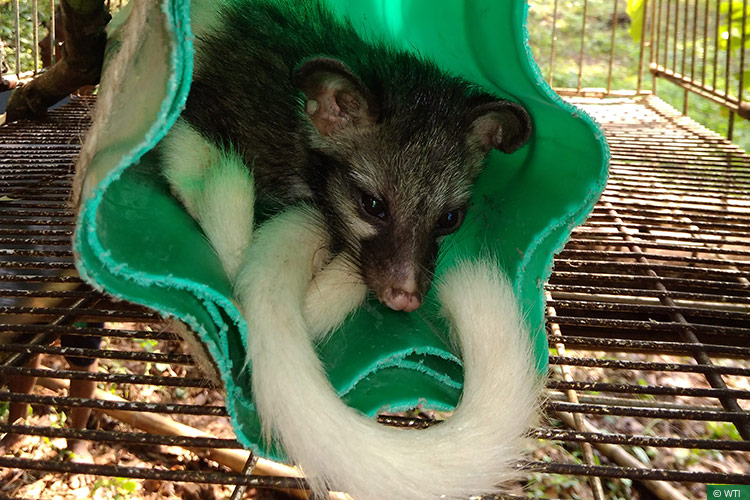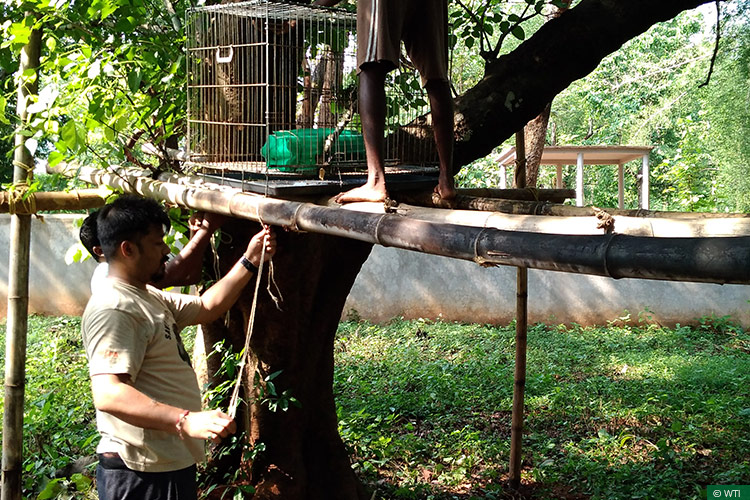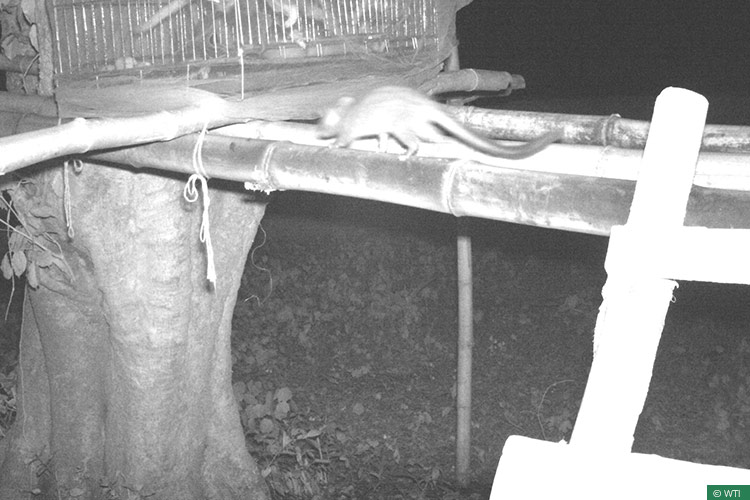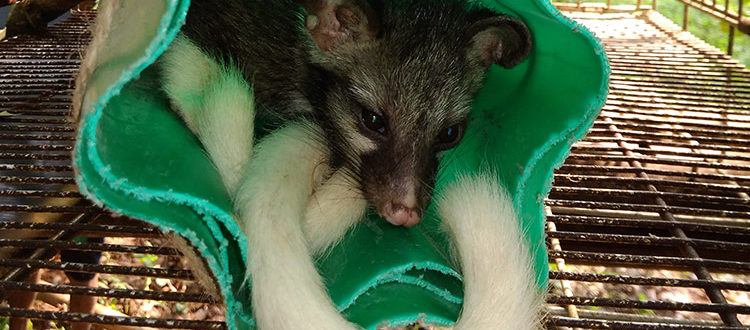MVS Unit in Similipal Rehabilitates Six Rescued Civet Pups Back to the Wild
 One of the leucistic civet pups in a pipe provided for cover in its acclimatisation cage
One of the leucistic civet pups in a pipe provided for cover in its acclimatisation cage
Similipal Biosphere Reserve, Odisha, June 30, 2017: Six common palm civet (Paradoxurus hermaphroditus) pups were recently rehabilitated into Similipal Tiger Reserve by the Mobile Veterinary Service – Similipal Biosphere Reserve (MVS-SBR) unit jointly run by Wildlife Trust of India (WTI) and the Similipal Tiger Conservation Foundation. The pups, all aged about three months, had been rescued in two separate incidents from areas around Similipal Tiger Reserve (STR).
In the first incident, three pups, all female, were brought to the MVS-SBR field station on April 28 from near Bhanjpur Railway Station, around 40km from Similipal. The MVS veterinarian and STR rescue team received information that a female civet with pups had taken shelter in an under-construction building in the area. The team tried to convince the owner that the mother would leave the building with her pups once they grew a little older, but he insisted that they be captured and removed. The mother was captured first but managed to escape and flee, leaving behind the three pups which were just over a month old at the time. As the pups were still in the nursing phase, the rescue team once again requested the owner to let them remain in the house, so that they could potentially be reunited with their mother. However, as he refused, they were brought to the MVS-SBR field station at Pithabata for hand-raising and eventual rehabilitation into the wild.
The MVS-SBR team rescued the other three civet pups in a similar incident earlier this month. The owner of a house in Baripada had informed the team about the presence of a female civet and her pups in his attic. The team tried to convince him to leave the animals where they were, but he entered the attic, causing the mother to flee with two pups. Fearing for the remaining pups the team decided to induct them into the rehabilitation programme with the previously admitted pups.
The pups, two females and a male, were over three months old and were all found to be leucistic (a partial loss of pigmentation rendering them half black and half white). Interestingly, it was learnt that civets found in the same house a couple of years ago had also been leucistic, indicating that the mother had been using the site to raise her young ones for a long time.
 MVS-SBR team members setting up cages at the acclimatisation site
MVS-SBR team members setting up cages at the acclimatisation site
Since all six civets housed at the MVS-SBR field station were over three months old, they were checked for injuries, weighed, sexed and taken to a pre-selected release site for acclimatisation. They were kept in two cages measuring 4x3x3 feet that were placed on trees about five feet above the ground. During the acclimatisation process they were provided naturally occurring fruits such as plums, mangoes and ficus sp. berries to help them become self-sufficient after they were released.
WTI has rescued over 135 civets through its Mobile Veterinary Service units over the last 15 years, including 16 through the MVS-SBR unit.
The idea of this kind of acclimatisation, with the young animals being kept in cages and provided food for two to three weeks, is that they should develop a fidelity to the site and return to the cages in anticipation of food and security post-release. As they grow older and more confident, they would naturally disperse into the wild and away from the release site.
The success of this method was evidenced when three of the civet pups were inadvertently released from their cage one morning. The team noticed that all three returned to the acclimatisation site the same evening and spent the night inside their cage. Camera traps were placed around the release site to document their movement and the frequency of their return to the cage, and supplementary feeding was continued. The three leucistic civet pups were also released from the other cage on June 28; the MVS-SBR team will continue to monitor them through camera traps.
Palm civets, also known as toddy cats, are small, nocturnal mammals native to tropical Asia and Africa. WTI has rescued over 135 civets through its Mobile Veterinary Service units over the last 15 years, including 16 through the MVS-SBR unit.
 A night vision camera trap image of one of the released civet pups returning to its cage at the acclimatisation site
A night vision camera trap image of one of the released civet pups returning to its cage at the acclimatisation site









